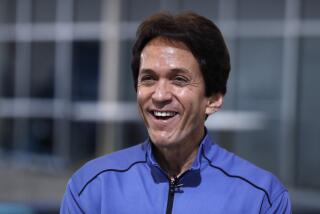CRISIS IN THE CARIBBEAN : Haiti Crisis Made for Long Sunday at White House : Diplomacy: For Clinton and aides, waiting was the name of the game as envoys hammered out a deal.
- Share via
WASHINGTON — Normally, this would be the scene around President Clinton’s White House on a warm, sunny Sunday in the fall: the President at church and then off to the golf course, aides absent and enjoying their one day off from work, quiet in the corridors, the door open on an empty, silent Oval Office.
Not so this Sunday. Outside the Oval Office, Secret Service guards stood nearly the entire day, the signal that the President was in, working the phones, waiting for word from his negotiators in Haiti. All day, aides passed through the room, moving back and forth between the Oval Office and the opposite corner of the West Wing, where National Security Adviser Anthony Lake talked intermittently by phone with the delegation, briefed advisers to exiled Haitian President Jean-Bertrand Aristide and monitored the performance of Administration spokesmen sending out the White House message on the Sunday talk shows.
Elsewhere in the West Wing, aides used to being at the center of the action waited nervously at their desks, listening occasionally to news reports on televisions tuned to CNN. They were drawn to work by the feeling that they just could not stay away but uncertain just what it was that they could do.
For them, the day was a sometimes frustrating experience in being where the action was not, knowing that the success or failure of the President’s threat of military force lay in the hands of three men far away--men whom they knew did not truly support the policy Clinton had crafted.
“It’s like the last hours of a campaign,” one official said. “You’ve done what you can, you’re sort of waiting for the result, but there’s really not a lot you can do.”
“You don’t want to be like a voyeur, trying to overhear what people are saying,” another aide said. “I’m just trying to stay out of the way.”
Clinton began his day meeting with his top national security advisers--Lake, Secretary of State Warren Christopher, Defense Secretary William J. Perry, White House Chief of Staff Leon E. Panetta and Gen. John M. Shalikashvili, chairman of the Joint Chiefs of Staff. The men reviewed their contacts with the delegation headed by former President Jimmy Carter in Haiti, and military plans for the invasion and occupation of Haiti. Late the night before, Clinton had spoken with Carter by telephone. Early in the morning he talked with Gen. Colin L. Powell, one of the negotiators and Shalikashvili’s predecessor as the nation’s top military officer.
Midmorning came the one note of normal routine: Clinton left the White House for the nearby Foundry United Methodist Church to attend Sunday services. Even there, however, the possibility of a war-to-come was not far distant. As the President bowed his head, the church’s pastor, the Rev. J. Philip Wogaman, asked the congregation to join him in prayer for the oppressed and hungry people of Haiti, for U.S. troops and for Clinton as he confronted “the awesome and sometimes very lonely responsibilities of leadership and decision.”
From there, it was back to the Oval Office for the President, and back to a nervous, watchful waiting for his aides.
As the day wore on, and as firm deadlines for the departure of the U.S. delegation from Haiti seemed to melt away, Clinton’s advisers sought to damp down reports of progress--warning in talk-show appearances that while a deal might be possible, the two sides remained apart in their positions.
Behind the scenes, officials seemed pessimistic. Late in the afternoon, Lake briefed Aristide’s top advisers. “I think it could be a late night,” one said afterward.
Carter had been reporting “glimmers” of progress that in his mind justified more talks, “but there’s still a long way to go,” the adviser said.
Only as night began to fall did the mood begin to shift. Aides met once again with Clinton as they reviewed the latest from Carter and his fellow emissaries. Shortly before 8 p.m. EDT, officials announced that Clinton would speak to the nation--the deal had been reached.
More to Read
Sign up for Essential California
The most important California stories and recommendations in your inbox every morning.
You may occasionally receive promotional content from the Los Angeles Times.














